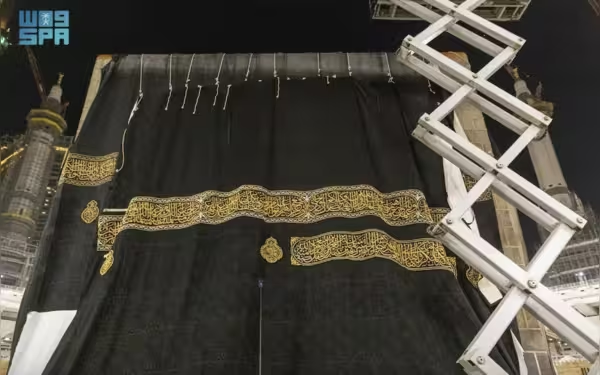Saturday, October 5, 2024 07:10 PM
King Abdulaziz Complex: Mastering the Kiswa Tradition
- Annual replacement of Kaaba's Kiswa marks Islamic New Year
- Over 200 craftsmen at King Abdulaziz Complex produce sacred cloth
- Intricate design and materials reflect reverence for Kaaba
 Image Credits: arabnewspk
Image Credits: arabnewspkLearn about the meticulous process of replacing the Kaaba's sacred Kiswa at the King Abdulaziz Complex in Makkah, highlighting the intricate design and craftsmanship involved in this deeply symbolic Islamic tradition.
Every year, on the first day of Muharram, a significant event takes place at the Kaaba in Makkah - the replacement of the black cloth covering the sacred structure, known as the Kiswa. This tradition marks the beginning of the Islamic New Year, or the start of the Hijri year. The process involves a team of 159 skilled technicians and craftsmen who meticulously carry out the task of removing the old Kiswa and replacing it with a new one.
At the King Abdulaziz Complex for Holy Kaaba Kiswa, located in Makkah, more than 200 craftsmen and administrators are dedicated to producing this special cloth. The complex is equipped with various departments specializing in different aspects of the Kiswa's creation, including dyeing, weaving (both machine and hand), printing, gold-plating, sewing, and assembling. A remarkable feature of the complex is the world's largest sewing machine, measuring 16 meters in length and operated by a computer system, used for the sewing and assembling process.
The production of the Kiswa involves the use of approximately 1,000 kilograms of raw silk, which is dyed black at the complex. Furthermore, 120 kilograms of gold wire and 100 kilograms of silver wire are intricately incorporated into the design of the cloth. The attention to detail and craftsmanship displayed in the making of the Kiswa emphasize the reverence and significance attached to this sacred tradition.
The annual replacement of the Kaaba's Kiswa is a deeply symbolic and meticulously executed tradition that showcases the dedication and skill of the craftsmen involved. The intricate design and materials used in the Kiswa reflect the importance of honoring the Kaaba, a central pillar of Islamic faith. This tradition serves as a reminder of the rich cultural heritage and spiritual significance associated with the Kaaba, uniting Muslims around the world in reverence and devotion.













